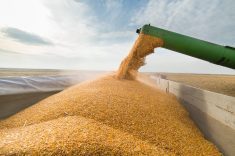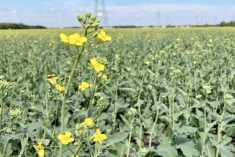Growers must keep deregistered canola varieties out of fields this spring, according to crop production program manager Arvel Lawson of the Canola Council of Canada (CCC).
“Canada’s bulk handling system for canola means that all growers play a role in keeping canola export ready,” Lawson said in a council release Thursday. “Each and every load of canola delivered to the elevator should satisfy the specifications of our key customers”.
Growers who seed deregistered canola varieties are making a decision that puts the entire industry at risk, the council said. International trade is becoming increasingly complex and the specific requirements of Canada’s key export markets are continuously in flux. Therefore, the CCC advises that the following canola varieties should not be seeded this spring:
Read Also

Senft to step down as CEO of Seeds Canada
Barry Senft, the founding CEO of the five-year-old Seeds Canada organization is stepping down as of January 2026.
- Roundup Ready Polish (B. rapa) canola: Hysyn 101 RR
- Bromoxynil-tolerant: 295BX, Cartier BX, Zodiac BX, Renegade BX
- Liberty tolerant: Exceed, 2631 LL, Swallow, SW Legion LL, SW Flare LL, LBD 2393 LL, Innovator, Independence, HCN 14, Phoenix
- Liberty Link hybrids: 3850, 2153, 3640, 3880, 2163, 2273
The recent European Union approval of T45 does not mean varieties containing this genetic event can be grown in Canada, the council emphasized. These varieties are still de-registered.
“The approval of T45 simply means that another export market is now open to Canadian canola but the expectation is that the presence of this event and others in Canadian shipments will continue to decrease over time,” said Lawson, who works in the council’s Winnipeg office. “Remember, if deregistered varieties are discovered, the entire shipment can be rejected and future monitoring will get even tougher.”
Importing countries monitor canola shipments closely and de-registered varieties can be detected, even at very low levels. Using registered varieties is the only way growers can be sure that they are not risking canola markets, the council said.
Many grain companies are no longer accepting delivery of deregistered products. Growers who have canola seed of deregistered varieties should contact their grain company before attempting to deliver.


















